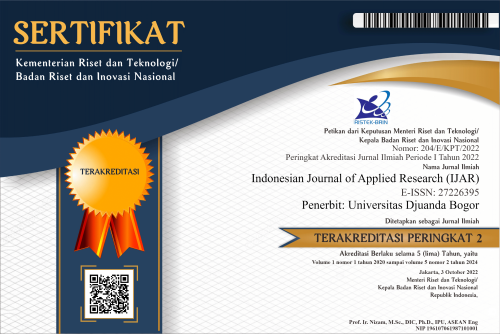Publication Ethics and Malpractice Statement
Indonesian Journal of Applied Research (IJAR) is a peer-reviewed electronic international journal. This statement clarifies ethical behaviour of all parties involved in the act of publishing an article in this journal, including the author, the chief editor, the Editorial Board, the peer-reviewer and the publisher (Universitas Djuanda). This statement is based on COPE’s Best Practice Guidelines for Journal Editors.
Ethical Guideline for Journal Publication
The publication of an article in a peer-reviewed Indonesian Journal of Applied Research (IJAR) is an essential building block in the development of a coherent and respected network of knowledge. It is a direct reflection of the quality of the work of the authors and the institutions that support them. Peer-reviewed articles support and embody the scientific method. It is therefore important to agree upon standards of expected ethical behavior for all parties involved in the act of publishing: the authors, the journal editors, the peer reviewers, the publisher and the society.
Universitas Djuanda as publisher of Indonesian Journal of Applied Research (IJAR) takes its duties of guardianship over all stages of publishing extremely seriously and we recognize our ethical and other responsibilities. We are committed to ensuring that advertising, reprint or other commercial revenue has no impact or influence on editorial decisions. In addition, the IJAR and Editorial Board will assist in communications with other journals and/or publishers where this is useful and necessary.
Research Misconduct Policy
The purpose of this policy is to prevent any misconduct related to research conducted for the journals and to suggest the fundamental principles and structural procedures in relation to research integrity deliberation required to ensure research ethics.
The range of misconduct policy
Research misconduct suggested in this policy pertains to fraud and refers to data fabrication, falsification, plagiarism, and improper authorship.
- "Fabrication" refers to any act involving the creation of false information about non-existing data or findings.
- "Falsification" refers to artificial manipulation of the research materials/equipment/process or randomly modification/deletion of data resulting in distorted research contents or research results.
- "Plagiarism" refers to acts of pirating others’ ideas, research contents, and research results without justifiable approvals or quotations.
- "Improper authorship" refers to cases where the person who has contributed to research contents or research results is scientifically and technically unqualified as an author or where someone who has not contributed to the research contents or research results scientifically and technically but has been listed as an author merely to express gratitude or courtesy.
- Intentional acts to disturb a fraud investigation about themselves or others or the acts which can be harmful to informants.
- Unfair evaluation regarding research of others or a disclosure or pirating of research ideas or research results acquired during the evaluation process.
- Severely aberrant acts that cannot be accepted in the community of the field of scientific and technology
How does the journal address misconduct
Editors and publishers have an ethical obligation to:
- Support the quality and ethics of the review process (pre-publication: weed out; prevent)
- Ensure the correctness of the published literature (post-publication: correct; communicate)
- Educate (prevent)
Editors/journals have an ethical obligation to respond to and address ethical allegations that may arise about published papers or papers in review. Systems and procedures are in place for investigating and addressing situations of misconduct, including cooperation with investigations from institutions or funding bodies.
Possible sanction
Should the evidence of misconduct is confirmed the following procedures are to be applied:
- Prior to publication (during review): The manuscript can be withdrawn from review
- Post-publication (literature correction) The journal may publish Retraction, Note of Editorial Concern, Errata/Correction with the author or authors’ (some or all) signature or editorial of an appropriate statement about the situation. The paper can be “marked” in the literature/PubMed.
- Editors determine whether retract or correct after considering whether the case is fraud or an honest mistake. They consider the intent And then extent to which the data is incorrect/misleading
- Author may be banned from submitting to the journal.
- Editors may, in some cases, provide information for other editors/publishers.
- Editors may publish of an editorial in the journal to discuss the issue generally and raise awareness of the issue.
Publication decisions
The editors of the IJAR are responsible for deciding which of the articles submitted to the journal should be published. The validation of the work in question and its importance to researchers and readers must always drive such decisions. The editors may be guided by the policies of the journal's editorial board and constrained by such legal requirements as shall then be in force regarding libel, copyright infringement and plagiarism. The editors may confer with other editors or reviewers in making this decision.
Fair play
An editor at any time evaluate manuscripts for their intellectual content without regard to race, gender, sexual orientation, religious belief, ethnic origin, citizenship, or political philosophy of the authors.
Confidentiality
The editor and any editorial staff must not disclose any information about a submitted manuscript to anyone other than the corresponding author, reviewers, potential reviewers, other editorial advisers, and the publisher, as appropriate.
Disclosure and conflicts of interest
Unpublished materials disclosed in a submitted manuscript must not be used in an editor's own research without the express written consent of the author.
Duties of Reviewers
Contribution to Editorial Decisions
Peer review assists the editor in making editorial decisions and through the editorial communications with the author may also assist the author in improving the paper.
Promptness
Any selected referee who feels unqualified to review the research reported in a manuscript or knows that its prompt review will be impossible should notify the editor and excuse himself from the review process.
Confidentiality
Any manuscripts received for review must be treated as confidential documents. They must not be shown to or discussed with others except as authorized by the editor.
Standards of Objectivity
Reviews should be conducted objectively. Personal criticism of the author is inappropriate. Referees should express their views clearly with supporting arguments.
Acknowledgement of Sources
Reviewers should identify relevant published work that has not been cited by the authors. Any statement that an observation, derivation, or argument had been previously reported should be accompanied by the relevant citation. A reviewer should also call to the editor's attention any substantial similarity or overlap between the manuscript under consideration and any other published paper of which they have personal knowledge.
Disclosure and Conflict of Interest
Privileged information or ideas obtained through peer review must be kept confidential and not used for personal advantage. Reviewers should not consider manuscripts in which they have conflicts of interest resulting from competitive, collaborative, or other relationships or connections with any of the authors, companies, or institutions connected to the papers.
Duties of Authors
Reporting standards
Authors of reports of original research should present an accurate account of the work performed as well as an objective discussion of its significance. Underlying data should be represented accurately in the paper. A paper should contain sufficient detail and references to permit others to replicate the work. Fraudulent or knowingly inaccurate statements constitute unethical behaviour and are unacceptable.
Data Access and Retention
Authors are asked to provide the raw data in connection with a paper for editorial review, and should be prepared to provide public access to such data (consistent with the ALPSP-STM Statement on Data and Databases), if practicable, and should in any event be prepared to retain such data for a reasonable time after publication.
Originality and Plagiarism
The authors should ensure that they have written entirely original works, and if the authors have used the work and/or words of others that this has been appropriately cited or quoted.
Multiple, Redundant or Concurrent Publication
An author should not in general publish manuscripts describing essentially the same research in more than one journal or primary publication. Submitting the same manuscript to more than one journal concurrently constitutes unethical publishing behaviour and is unacceptable.
Acknowledgement of Sources
Proper acknowledgment of the work of others must always be given. Authors should cite publications that have been influential in determining the nature of the reported work.
Authorship of the Paper
Authorship should be limited to those who have made a significant contribution to the conception, design, execution, or interpretation of the reported study. All those who have made significant contributions should be listed as co-authors. Where there are others who have participated in certain substantive aspects of the research project, they should be acknowledged or listed as contributors. The corresponding author should ensure that all appropriate co-authors and no inappropriate co-authors are included on the paper, and that all co-authors have seen and approved the final version of the paper and have agreed to its submission for publication.
Hazards and Human or Animal Subjects
If the work involves chemicals, procedures or equipment that have any unusual hazards inherent in their use, the author must clearly identify these in the manuscript.
Disclosure and Conflicts of Interest
All authors should disclose in their manuscript any financial or other substantive conflict of interest that might be construed to influence the results or interpretation of their manuscript. All sources of financial support for the project should be disclosed.
Fundamental errors in published works
When an author discovers a significant error or inaccuracy in his/her own published work, it is the author’s obligation to promptly notify the journal editor or publisher and cooperate with the editor to retract or correct the paper.





 This work is licensed under a
This work is licensed under a 